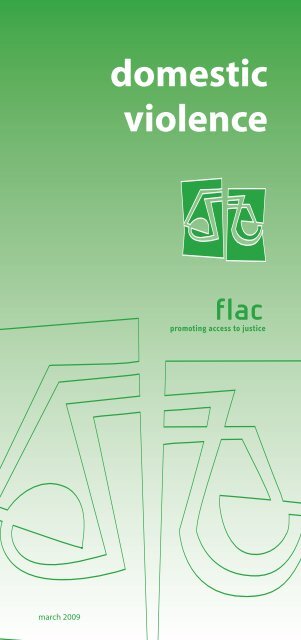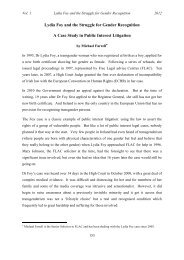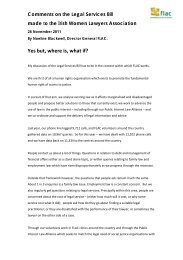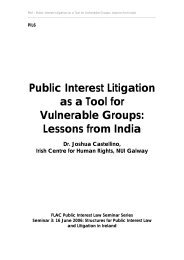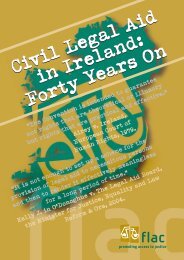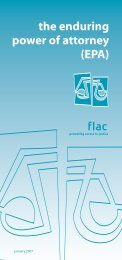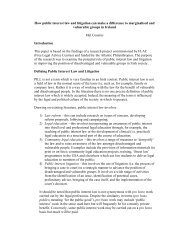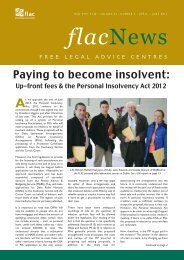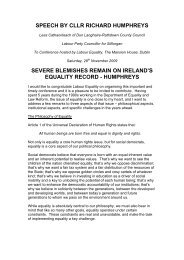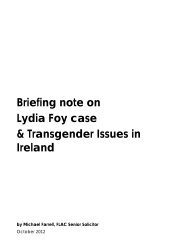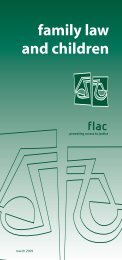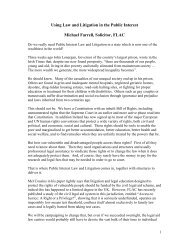domestic violence - FLAC (Free Legal Advice Centres)
domestic violence - FLAC (Free Legal Advice Centres)
domestic violence - FLAC (Free Legal Advice Centres)
Create successful ePaper yourself
Turn your PDF publications into a flip-book with our unique Google optimized e-Paper software.
<strong>domestic</strong><br />
<strong>violence</strong><br />
march 2009
The Domestic Violence Act 1996 provides<br />
for the protection, safety and welfare of<br />
married couples, cohabiting couples, parents,<br />
children and any other people who live in a<br />
<strong>domestic</strong> relationship. Safety and welfare<br />
includes the physical, emotional and mental<br />
welfare of the person in question.<br />
The Non-Fatal Offences against the<br />
Person Act 1997 is also relevant in <strong>domestic</strong><br />
<strong>violence</strong> situations, particularly where a couple<br />
is unmarried or else not cohabiting.<br />
Under this Act a person can be charged with<br />
the offence of assault, assault causing harm<br />
or serious harm, or with the offence of<br />
making threats to kill or cause serious harm.<br />
Other offences that a person can be charged<br />
with under this Act are the offences of<br />
coercion, harassment or endangerment.<br />
Protection Available<br />
Under the Domestic Violence Act the<br />
following orders may be obtained:<br />
<br />
<br />
<br />
Safety Order<br />
Barring Order<br />
Protection Order<br />
If any of these orders are breached by the<br />
offender the Gardai have immediate powers<br />
of arrest. The matter will come before the<br />
courts as a criminal matter and is heard in<br />
open court.<br />
All of these orders can be appealed.<br />
2
Safety Order<br />
This order prevents the wrongdoer (the<br />
respondent) from committing further<br />
<strong>violence</strong>, or threatening <strong>violence</strong>, against the<br />
applicant (the person looking for protection)<br />
and his/her dependents. The respondent is<br />
not required to leave the home.<br />
If the applicant and alleged offender are not<br />
living together, the court can order the<br />
alleged offender not to watch (regularly or<br />
continuously be looking at and observing<br />
comings and goings) or be near the<br />
applicant’s home.<br />
Who can apply for one?<br />
<br />
<br />
<br />
<br />
The spouse of the respondent, irrespective<br />
of how long they have lived together, on<br />
his/her own behalf or on behalf of a child.<br />
An unmarried partner, who has lived as<br />
husband/wife with the respondent for at<br />
least six months out of the previous 12<br />
months before the application for the<br />
safety order was made.<br />
A parent can apply for an order against a<br />
child who is not a dependant (an adult<br />
child).<br />
A person of full age (over 18) who lives<br />
with the respondent in a relationship, the<br />
basis of which is primarily non-contractual,<br />
i.e. not a lodger or tenant.<br />
3
Relatives who live together (including<br />
adoptees).<br />
The Health Service Executive.<br />
If the relationship is not based on<br />
marriage the court considers the following<br />
factors:<br />
<br />
<br />
<br />
<br />
The length of time the people involved<br />
have lived together.<br />
The type of duties carried out by either<br />
person for the other or for their family.<br />
If any payment or other consideration was<br />
made by one person to the other for living<br />
expenses.<br />
Other matters the court considers<br />
appropriate in a particular situation.<br />
Grounds for a Safety Order<br />
Safety orders will be granted where the court<br />
considers there are reasonable grounds for<br />
believing that a person’s safety or welfare (or<br />
that of a dependant) is at risk.<br />
4
What can a Safety Order tell the<br />
respondent to stop doing?<br />
The court can order the respondent:<br />
a not to use, or threaten to use, <strong>violence</strong> on<br />
or put in fear or molest the applicant or<br />
any dependant.<br />
b to stay away from the residence of the<br />
applicant, if the parties do not live at the<br />
same address.<br />
The order does not require the respondent to<br />
leave the home if the parties reside at the<br />
same address.<br />
Note: A safety order can be varied, meaning<br />
the court can change the length of time for<br />
which the order lasts or its terms.<br />
The court will hear applications from either<br />
side and, depending on the evidence before<br />
it, will make whatever order it sees fit.<br />
Duration of a Safety Order<br />
An order made by a District Court can last up<br />
to five years. Before this order expires, an<br />
application can be made to have it extended<br />
for a further five years or for a shorter period<br />
as the court sees fit. Safety Orders obtained<br />
to protect a dependant cease when that<br />
person comes of age. The Circuit Court can<br />
grant a Safety Order of unlimited duration.<br />
5
Non-compliance with a Safety Order<br />
Under the Domestic Violence Act it is an<br />
offence to breach a Safety, Protection, Barring<br />
or Interim Barring Order. The penalty is a fine<br />
not exceeding €1,904.61 and/or a prison term<br />
of 12 months. Gardai can arrest a respondent<br />
without a warrant or enter and search any<br />
place they suspect that person to be.<br />
Barring Order<br />
This order requires the violent person (the<br />
respondent) to leave the family home until the<br />
order expires or is set aside. The District Court<br />
may grant a Barring Order for up to three<br />
years and an application for an extension can<br />
be made.<br />
There is no time limitation on such an order if<br />
made by the Circuit Court. If the applicant is<br />
married to the violent person, then it is<br />
irrelevant how long the couple have lived<br />
together or who owns all or most of the<br />
house.<br />
6
Once a Barring Order is granted, the<br />
offender must:<br />
<br />
<br />
<br />
<br />
Leave the home.<br />
Not use, or threaten to use, <strong>violence</strong><br />
against the applicant.<br />
Not molest the applicant or put them in<br />
fear.<br />
Not be in the area where the applicant<br />
lives.<br />
Who may apply for a Barring Order?<br />
<br />
<br />
<br />
<br />
A spouse on his/her own behalf, or on<br />
behalf of a dependent child.<br />
A partner who has lived with the alleged<br />
offender as husband and wife for at least<br />
six of the previous nine months. However<br />
the applicant must have significant<br />
ownership rights in the family home.<br />
A parent of an adult child can apply for an<br />
order against him/her, unless that child<br />
owns the family home or has greater<br />
ownership rights than the parent.<br />
The Health Service Executive.<br />
Protection Order<br />
While you are waiting for the court to decide<br />
on an application for a Safety or Barring<br />
Order, the court can give you an immediate<br />
order called a Protection Order.<br />
This has the same effect as a Safety Order but<br />
as it is only intended to last until the court<br />
decides on your case, it is temporary.<br />
7
Interim Barring Order<br />
In exceptional cases this order will be granted.<br />
There must be evidence of immediate risk of<br />
significant harm to the person applying and a<br />
Protection Order must also be considered<br />
insufficient in the circumstances. Evidence is<br />
usually given by the person who is in fear of<br />
the <strong>violence</strong> swearing an affidavit with the<br />
help of a court clerk. This gives factual details<br />
of the violent situation.<br />
This order can be granted without the<br />
knowledge of the alleged offender (this is<br />
called an ex parte application), but that<br />
person must be served immediately with a<br />
copy of the statement upon which the order<br />
was made.<br />
A full court hearing of the facts must take<br />
place within eight working days of the Interim<br />
Barring Order being made.<br />
A person seeking an Interim Barring Order<br />
should go to their local District Court. Court<br />
clerks can be helpful in filling out application<br />
forms.<br />
If you wish to take legal action, you should<br />
seek advice from a lawyer, although in the<br />
case of an Interim Barring Order it is<br />
important to note that a solicitor is not<br />
necessary at the first ex parte hearing stage.<br />
8
Applicants can represent themselves<br />
throughout the process, although this is not<br />
advisable. <strong>Legal</strong> Aid can be available.<br />
<strong>Legal</strong> Aid<br />
You may be eligible for legal aid if you are a<br />
person of moderate means. To qualify for<br />
legal aid in civil cases your disposable income<br />
and assets must be below a certain limit,<br />
there must be merit to the case and there<br />
must be no more satisfactory way of resolving<br />
the problem. After approval, the <strong>Legal</strong> Aid<br />
Board provides you with the services of a<br />
solicitor and, where necessary, a barrister. You<br />
can apply for legal aid for more than one<br />
matter at a time. The Board’s offices are called<br />
Law <strong>Centres</strong> and are located around the<br />
country. For the location of your nearest Law<br />
Centre, call 1890 615 200.<br />
All those who are granted legal advice and/or<br />
legal aid must pay a fee called a contribution<br />
to the Board. The minimum contribution is<br />
€10 for legal advice and €50 for legal aid.<br />
The law centre staff will advise a person of<br />
the actual contribution in each individual case.<br />
As of 1 September 2006 the new disposable<br />
income limit of a person applying for legal aid<br />
has been increased from €13,000 up to<br />
€18,000 per year.<br />
The maximum allowance (this is an expense<br />
which the rules allow you to deduct when<br />
9
calculating your disposable income) on<br />
childcare facilities if you are working is<br />
€6,000 per child per year. The maximum<br />
allowance on accommodation costs (e.g. rent)<br />
is now €8,000 per year.<br />
The value of an applicant’s home and its<br />
normal contents are excluded when assessing<br />
the value of his/her capital resources<br />
(property), as are the value of the tools of an<br />
applicant’s trade.<br />
For details of other allowances, contact the<br />
<strong>Legal</strong> Aid Board or your local Law Centre.<br />
Women’s Aid: This voluntary organisation<br />
provides on-going support and information to<br />
women suffering from <strong>domestic</strong> <strong>violence</strong>. A<br />
freephone helpline gives confidential<br />
information and can refer callers to other<br />
necessary services 7 days a week, 10 am to 10<br />
pm. Person-to-person advice and information<br />
appointments are also available by calling the<br />
helpline. A court accompaniment scheme<br />
provides support for women going through<br />
the courts system.<br />
Women’s Aid freephone national helpline:<br />
1800 341 900<br />
Website: www.womensaid.ie<br />
Amen: A confidential helpline and support<br />
service for male victims of <strong>domestic</strong> abuse and<br />
their families.<br />
Helpline: 046 902 3718<br />
Website: www.amen.ie<br />
10
notes
<strong>FLAC</strong> Mission Statement:<br />
<strong>FLAC</strong> is an independent human rights<br />
organisation dedicated to the<br />
realisation of equal access to justice<br />
for all. It campaigns through advocacy,<br />
strategic litigation and authoritative<br />
analysis for the eradication of social<br />
and economic exclusion.<br />
While every effort has been made to<br />
ensure the accuracy of this leaflet, it is<br />
provided for general legal information<br />
only and is not intended as a<br />
substitute for legal advice. <strong>FLAC</strong> does<br />
not accept any legal liability for the<br />
contents of this leaflet. Persons with<br />
specific legal problems should consult<br />
a solicitor.<br />
Funded and supported by<br />
<strong>Free</strong> <strong>Legal</strong> <strong>Advice</strong> <strong>Centres</strong><br />
13 Lower Dorset Street<br />
Dublin 1<br />
LoCall: 1890 350 250<br />
Tel: 01 874 5690<br />
Email: info@flac.ie<br />
Website: www.flac.ie<br />
designed and printed by printwell co-operative, dublin one


